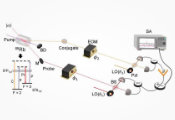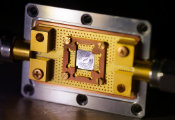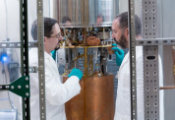Dr. Obert Golim Receives a PoDoCo Grant to Develop 3D Integration Process for SemiQon’s Quantum Processor
July 22, 2025 - SemiQon’s Junior Quantum Integration Engineer Dr. Obert Golim has been awarded a highly competitive PoDoCo grant to continue his work on 3D integration techniques for silicon-based quantum processors at SemiQon. The grant, valued at EUR 32,000, will support his research over a one-year period.
SemiQon’s work to develop solutions to some of the most pressing scalability bottlenecks in quantum computing has received a new boost with the PoDoCo (Post Docs in Companies) grant awarded to Dr. Obert Golim. Golim, who received a Doctor of Science from Aalto University in February 2025, will continue his research as part of SemiQon’s team with the grant specifically designed to young research talent in industry.
The PoDoCo program is supported by various Finnish foundations and its aim is to promote academic research supporting long term competitiveness and strategic renewal of Finnish companies, as well as the employment of young doctors in industry.
During the grant period, the main objective of Dr. Golim’s research is to establish 3D integration process for the next generation of SemiQon’s quantum processors.
“I feel that the research project is an important gateway for me to see how my research could be used for commercial applications. Although the results from my previous study have been shown to be promising for industrial purposes, I have never had the opportunity to practically apply it for a real use-case, until now,” Dr. Golim explains.
The results from Dr. Golim’s work are critical in demonstrating the practical applications of quantum computers (QC) containing millions of physical qubits.
At present, there is a bottleneck in realizing the promises of quantum computing stemming from the numerous interconnects and large device footprint. 3D integration processes combined with SemiQon’s unique Cryo-CMOS device could be an innovative solution in the field as it would significantly decrease the required amount of cabling, while providing better control fidelity.
“The next generation of quantum processors resulting from this project could make quantum computers more accessible for research institutions, industries, and eventually the commercial market,” Golim envisions.




































